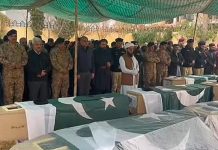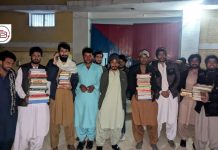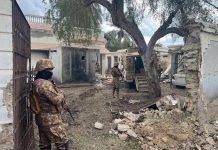In the wake of a significant police crackdown on the ‘Baloch Genocide’ march in Islamabad, which resulted in the arrest of over 300 protesters, the Baloch Yakjehti Committee (BYC) has issued a three-day ultimatum to the Pakistani authorities.
The BYC demanded the immediate release of demonstrators detained during the recent protests and the dismissal of charges against them. They warned that failure to comply would lead to “harsh steps,” holding the state and its administration responsible.
In a statement released on social media, the BYC expressed deep concern about the status of the detained individuals. They noted that while some protesters, including women and 33 students, have received bail, more than 250 remain in jail. Alarmingly, over 100 students are still ‘missing,’ having not been presented before any court since their detention.
The BYC disputed the Islamabad police’s reports on the release of detained protesters as inaccurate. “Contrary to circulating reports, the release of 167 Baloch students and activists is not accurate. Despite initial bail, their release has been systematically delayed,” the BYC stated.
Mahrang Baloch, a prominent figure in the protests, voiced these concerns on the social media platform ‘X’. She stated, “Out of 250 students, over 100 students’ status is missing; they have not been presented in any court. If the students are not released and FIRs against peaceful protestors are not withdrawn, then the long march will be compelled to take harsh steps, and the state will be responsible.”
In addition to immediate demands, the BYC has outlined a comprehensive charter of demands. This includes a request for a UN-led fact-finding mission to Balochistan, the recovery of all missing Baloch persons, particularly those whose families were present at the sit-in outside the National Press Club, admissions by the Counter-Terrorism Department (CTD) regarding staged killings, and the dismantlement of alleged state-backed ‘death squads’ in the region.
In a significant act of protest on Saturday, British-Pakistani writer Mohammed Hanif returned his Sitara-i-Imtiaz, denouncing human rights abuses in Balochistan. On ‘X’, Hanif lamented, “Journalists of my generation have seen Sammi Deen Baloch and Mahrang Baloch grow up in protest camps. Ashamed to witness a new generation being denied basic dignity.”
Following the crackdown in Islamabad, protests have erupted across Balochistan and other Baloch-populated areas. Thousands in Quetta, Hub, Kalat, and D.G Khan blocked major highways in solidarity, while in Turbat, calls were made to boycott the upcoming elections and parliamentary politics. Protests in Khuzdar, Panjgur, Gwadar, Awaran, and other areas have illustrated the scale of the response. The Baloch communities in Karachi, Hyderabad, Thatta, and other regions also held significant protest activities.






























